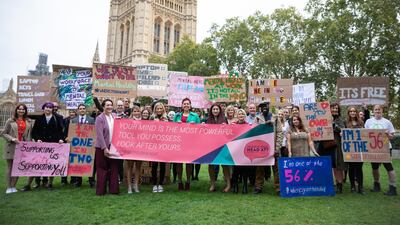Tomorrow is World Mental Health Day, and this year the focus is on young people and our changing world. These themes are, of course, particularly relevant to a nation such as the UAE, with its youthful population and rapid pace of social and economic development.
On the matter of change, one of the most impressive projects the UAE has ever undertaken has been the swift establishment of a world-class healthcare infrastructure, including mental health services. Back in the 1980s, individuals requiring mental health care here would have had to travel overseas. Plans to rectify this situation were put in place by the nation’s Founding Father, Sheikh Zayed, and the UAE’s first psychiatric hospital opened in 1995. Since then, provision has improved steadily.
Globally speaking, the need for mental health services has never been greater. Mental health disorders are the leading cause of disability around the world, with an estimated 30 per cent of the world’s population experiencing a mood, anxiety or substance-related disorder at some point in their life.
The term “cause of disability” is a coldly functional one from the world of health economics. It refers specifically to productivity and a person’s ability to work. Still, the underlying message is loud and clear: failure to invest in mental health is costly in every way.
The situation for the UAE is similar to that of the global picture. According to the Global Burden of Disease Study 2010 – a collaboration funded by the Bill & Melinda Gates Foundation and led by the World Health Organisation among others – three of the country's leading causes of disability are related to mental health. The number-one spot goes to depressive disorders, with substance-related and anxiety disorders ranked at numbers five and seven respectively.
The UAE has responded to this emerging problem in a decisive and proactive way. Earlier this year, Dubai launched its mental health plan in a document titled Happy Lives, Healthy Communities. This publication contains the first comprehensive mental health strategy for Dubai and leads the way for an increasingly systematic and joined-up approach across the UAE.
Last weekend, at the sixth International Psychology Conference Dubai, Dr Nadia Dabbagh – a consultant child and adolescent psychiatrist at Rashid Hospital and one of the strategy’s architects – presented an overview of the plan to an audience of the region’s mental health professionals. I was particularly impressed by the emphasis placed on self-care and the promotion of wellbeing.
There is a definite movement towards preventative therapies and away from old reactive models, in which professionals seemingly waited for a person to reach crisis point which then referred them to specialist hospitals. The Dubai strategy also talks about introducing a mental health act, a crucial piece of legislation that will further clarify and safeguard the rights of people living with mental health disorders.
Genuine progress has been made, but important challenges still lie ahead for the UAE. One faced by many nations is a shortage of individuals capable of delivering psychological therapies. This approach – which relies on talking, not medication – has proven highly effective in the treatment of conditions such as anxiety and depression.
The reduction of stigma surrounding mental health issues in the UAE is an extremely positive development. An increasingly open environment will encourage many more people to seek help. However, it can be huge setback for those who do come forward to find that there is a long waiting list for psychological therapies or, worse still, that the only treatment options available are based solely on the taking of pills.
A further consideration in the advancement of mental wellbeing promotion in the UAE is to ensure that the treatments or preventative interventions offered are sensitive to the needs of the country’s population. A broken leg is a broken leg in any language, but a broken heart can take on very different nuances across cultures. As a vibrantly multicultural nation, the UAE will need to recruit psychiatrists, psychologists and psychotherapists from all over the world. However, it is vital that a significant number of them are home grown and able to deliver evidence-based psychological therapies specifically tailored to this region.
The Dubai mental health strategy captures something of this aspiration with its aim to “promote mental wellbeing … within an integrated, comprehensive, culturally appropriate system”. World Mental Health Day is all about hope. In the decade that I have lived in the UAE, I have witnessed massive improvements in mental health care. Now, I am even more optimistic for the future.
Dr Justin Thomas is professor of psychology at Zayed University


